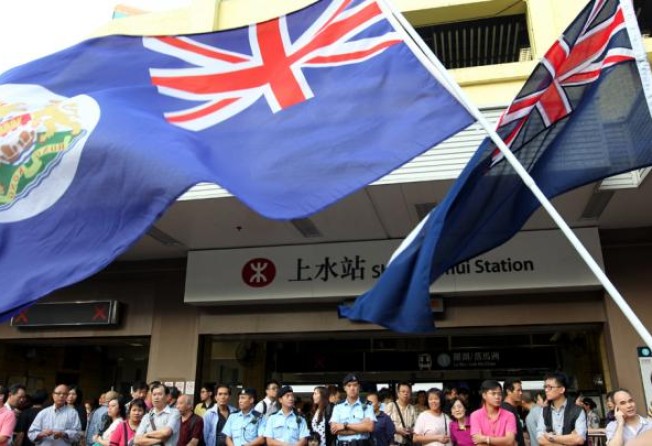Flagging up fears over threat to Hong Kong's autonomy
Surya Deva says waving colonial flags is a symbolic show of resentment

Yu Zhengsheng, a member of the Politburo Standing Committee, recently denounced Hong Kong activists who waved colonial flags during protests, and warned that "opposition" and "centrifugal forces" would not be allowed to rule the city after universal suffrage was introduced. This was followed by Zhang Dejiang, another Politburo member, reminding Hongkongers of the importance of safeguarding national security.
The central government is rightly worried by the waving of colonial flags, but for the wrong reasons. There is no threat to "one country"; the real threat is to the "two systems" and the guaranteed high degree of autonomy under the Basic Law.
Waving colonial flags is an expression of grave resentment rather than a reflection of a desire to bring back British rule or push for cession from China.
It is not an "action", but more a "reaction" to several decisions and policies of the local administration and/or Beijing. The list is long - national education, frequent referrals to the Standing Committee to interpret the Basic Law, the insertion of pro-Beijing people in key institutions disguised as independents, delaying or obstructing the introduction of universal suffrage, denial of Hong Kong visas to Chinese dissidents, and the row over milk power and maternity beds.
One fundamental difference between Hong Kong - at least until 2047 - and the mainland that Chinese leaders seem to ignore is that the expression of diverse and dissenting views is permitted within well-defined parameters. This freedom is not limited to saying things pleasing to others or consistent with what the ruling leadership wants to hear. Nor is this freedom available merely on paper, unlike on the mainland where dissent is suppressed as a matter of state policy despite Article 41 of the constitution empowering Chinese citizens "to criticise and make suggestions regarding any state organ or functionary".
Hopefully these differences will disappear by 2047. It will be unfortunate, though, if it is on account of Hong Kong adopting democracy, the rule of law and judicial independence with so-called "Chinese characteristics".
The display of colonial flags may invite further reaction from Beijing, thus creating a cycle, so how can this be avoided? First, what is needed is not superficial treatment of the symptoms, but an understanding of, and commitment to redress, the causes. Second, suspicion and secrecy should give way to transparency and exchanges, particularly with regard to Article 23 and the implementation of universal suffrage.
Third, while universal suffrage and democracy are not a panacea, there is some value in accepting these as an end in themselves. Fourth, it is unrealistic to expect Hongkongers to adopt a Communist-Party-like allegiance to the motherland. Finally, establishing a joint representative co-ordination committee might help to solve contentious issues affecting both Hongkongers and mainlanders.
A certain level of tension is inherent in "one country, two systems". This is likely to grow as Hong Kong gradually moves towards democracy and Beijing introduces additional controlling measures in response. But tensions can be smoothed out if a model of integrated autonomy is adopted.
Hong Kong is inseparable from the mainland in political, geographic, economic, social and cultural terms. This should not, however, be used to suppress or limit the unique identity of Hong Kong and its people. In fact, national unity will be better preserved by respecting diversity and safeguarding the constitutional autonomy of different regions.
Independence or a return to British rule is not an option. But Hongkongers should not be pushed into such reactions by suppressing their way of life, thinking and legal system.
Surya Deva is an associate professor at the School of Law of City University of Hong Kong